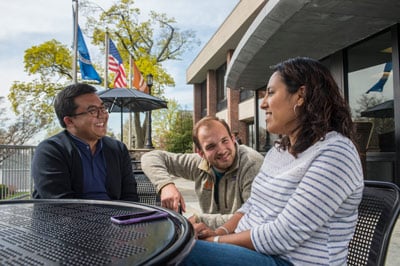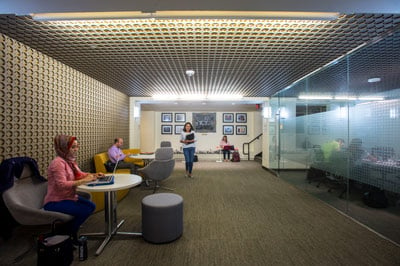2018 Graduate Education | International Affairs
THIS GUIDE IS NO LONGER ACTIVE. For the current FP Guide, click here.
The Fletcher School of Law and Diplomacy at Tufts University
“All the easy problems are solved. Only the sticky, tough ones are left,” Dyan Mazurana likes to tell her students at The Fletcher School of Law and Diplomacy at Tufts University.
Mazurana, associate research professor and co-director of Fletcher’s Gender Analysis in International Studies and Women’s Leadership Program, is an expert in gender-based crimes committed during armed conflict. She consults with a number of governments, United Nations agencies, and NGOs on how to tackle these tough problems. And she makes sure her students are equipped to address global challenges across the sectors of government, business, and civil society.

“The kinds of students who come to Fletcher are not shrinking violets. Some students make a career choice that they realize will take them to challenging environments.” –Dyan Mazurana, PhD, Associate Research Professor and Co-Director, Gender Analysis in International Studies and Women’s Leadership Program, The Fletcher School of Law and Diplomacy at Tufts University
To prepare students for their future careers, The Fletcher School’s programs combine theory with practice. Students learn hard skills such as policy analysis, finance, international law, and econometrics; practical skills such as negotiation, conflict resolution, leadership, and public communication; and cultural skills such as regional expertise and diplomatic history, coupled with proficiency in a second language.
 “Fletcher is one of the leading schools teaching and doing research in gender and international relations,” says Mazurana. “Students learn about the gender issues involved in everything from refugee crises, peace operations, and international justice to the gender-related consequences of man-made crises and natural disasters.”
“Fletcher is one of the leading schools teaching and doing research in gender and international relations,” says Mazurana. “Students learn about the gender issues involved in everything from refugee crises, peace operations, and international justice to the gender-related consequences of man-made crises and natural disasters.”
Mazurana’s 2017 research, which garnered international media attention, made clear that it is now time for a #MeToo response to sexual harassment and assault happening among humanitarian aid workers.
“We looked at more than 2,000 surveys of aid workers and interviewed many who were survivors of sexual harassment and assault. We thought we would find that most of those who were assaulting workers were members of armed groups or civilians in lawless areas. In truth, however, it was mostly the aid workers’ own colleagues. It really surprised and saddened me,” Mazurana says.
 The assaults were mostly by men in supervisory positions or acting as security officers and were often carried out in aid workers’ compounds, where they were supposed to be safe, she says. Women were the primary targets, and L.G.B.T.Q. workers were also vulnerable, she adds.
The assaults were mostly by men in supervisory positions or acting as security officers and were often carried out in aid workers’ compounds, where they were supposed to be safe, she says. Women were the primary targets, and L.G.B.T.Q. workers were also vulnerable, she adds.
As with the recent reports of sexual harassment and assault in the entertainment industry, aid workers who tried to report these incidents often faced retaliation. “In most cases, internal reporting within the mission results in the complaint crossing the desk of the upper-level person who perpetrated it or those who support him,” Mazurana’s research showed.
Media coverage of her study’s findings has helped bring increased pressure on governmental agencies and the UN to do more to protect aid workers by strengthening reporting and investigation of sexual harassment and assault. Mazurana says this gives her hope.
She is also proud of her students who, despite hearing about these problems, have not been deterred from their commitment to help make the world a better, safer place. “The kinds of students who come to Fletcher are not shrinking violets. Some students make a career choice that they realize will take them to challenging environments,” Mazurana says.
 Fletcher’s strong commitment to including gender analysis in its broad range of programs and courses has made it one of the leading schools to study gender and international affairs at the master’s and doctoral levels. These courses are some of the most popular among both male and female students.
Fletcher’s strong commitment to including gender analysis in its broad range of programs and courses has made it one of the leading schools to study gender and international affairs at the master’s and doctoral levels. These courses are some of the most popular among both male and female students.
The Fletcher School has among the highest percentages of women faculty in tenure and tenure-track positions and other senior-level faculty positions of the member schools of the Association of Professional Schools of International Affairs (APSIA).
Mazurana is pleased with the example Fletcher has set and hopes other schools will follow suit, both in terms of faculty hires as well as curriculum. “As I tell my students, ‘Anytime humans are involved, it’s always deeply gendered,’” says Mazurana.
Graduate Degree Programs in International Affairs:
• Master of Arts in Law and Diplomacy (MALD)
• Master of International Business (MIB)
• Master of Arts in Transatlantic Affairs (MATA), Joint degree with the College of Europe
• Master of Arts in Humanitarian Assistance (MAHA), Joint degree with the Gerald J. and Dorothy R. Friedman School of Nutrition Science and Policy at Tufts University
• Global Master of Arts Program (GMAP, mid-career)
• Master of Arts (MA, mid-career)
• Master of Laws in International Law (LLM)
• Master of Global Business Administration (GBA; online starting May 2019)
• PhD in International Relations
• PhD in Economics and Public Policy
Visit the Request Info page to receive more information.
Contents
- 2018 Graduate Education | International Affairs
- Johns Hopkins University, School of Advanced International Studies (SAIS)
- UC San Diego, School of Global Policy and Strategy (GPS)
- NYU School of Professional Studies, Center for Global Affairs
- University of Notre Dame, Keough School of Global Affairs
- Georgetown University, Walsh School of Foreign Service (SFS)
- SOAS University of London
- Yale University, Jackson Institute for Global Affairs
- University of Kent, Brussels School of International Studies (BSIS)
- Seton Hall University, School of Diplomacy and International Relations
- The Fletcher School of Law and Diplomacy at Tufts University
- University of Denver, Josef Korbel School of International Studies
- Arizona State University, Center on the Future of War